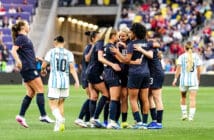Deep in south-west London lies a football club that should keep the likes of Florentino Perez, Andrea Agnelli and John W. Henry awake at night.
As oligarchs, sovereign wealth funds and venture capitalists create greater and greater distance between some of Europe’s most prestigious clubs and those that support them through their attempts to ring-fence the majority of football’s wealth, AFC Wimbledon have remained in the hands of their most important asset.
Over the past 19 years, the Dons have risen from playing in the Combined Counties League to become regular members of the Football League, all while being majority fan-owned and therefore never making decisions that would in anyway insult their history or standing as a club.
The decision of a three-person FA commission in 2002 to allow Wimbledon FC to have it’s name changed and the club re-located to the Buckinghamshire town of Milton Keynes, 60 miles north of where it had been founded in 1889, is evidence that there are issues in the game that lie beyond the demise of the Super League, yet the success of the club since its reformation has been one of football’s most inspiring stories.
They are one of only three majority supporter-owned football clubs in the EFL thanks to a commitment to hold at least a 75% stake by the 3000-person strong collective known as the Dons Trust, and having added to a run of five promotions in nine seasons that restored Football League status in 2011, an unexpected promotion to League One was secured through the play-offs in 2016.
Whilst executives at twelve of Europe’s wealthiest clubs were dreaming up a competition whereby 15 clubs would remain permanent members in order to guarantee a gluttonous stream of income, undermining the football pyramids in some of the world’s most historic leagues in the process, the Dons have been struggling.
Life in the third tier has been characterised by battles against relegation in a division that is littered with clubs that were in the Premier League not so long ago, and others that have owners who are willing to spend heavily in order to reach the top tier in the not-so-distant future.
The inherent nature of being a fan-owned club means that Wimbledon have had to be creative in the transfer market whilst also relying heavily on their own youth development system to remain competitive.
Even though the club has played an important role in launching or re-invigorating the careers of the likes of Lyle Taylor, Toby Sibbick and Aaron Ramsdale, who are all now established at a higher level, only a miraculous run of form in the second half of the season secured League One status in 2018/19. And the Dons controversially avoided relegation when the league was decided on points per game at the end of last season.
Even the announcement of a romantic return to their former home of Plough Lane has not been without its issues.
Wimbledon had been forced to leave the old Plough Lane in 1991, as the Taylor Report meant it would not have been up to the requirements needed to host matches in the aftermath of the Hillsborough disaster and the club’s board deemed the ground to be beyond redevelopment, beginning a spiral that involved a ground share at Selhurst Park up until the controversial relocation.
Since reformation, the club ground-shared with Isthmian League side Kingstonian at Kingsmeadow before eventually the Dons Trust purchased the ground, but plans were announced in 2013 for an emotional return to Plough Lane.
The local council gave the go-ahead for the plans in 2015, with work starting on converting a former greyhound track into a 9,000 seater stadium beginning in early 2018.
However, building costs and significant delays left Wimbledon in serious need of funds in order to complete the project.
The symbiotic nature of the relationship between this club and its supporters was never more evident than when a bond scheme was launched to generate funds to allow the construction of the new ground to be completed.
Over £5 million was raised in the space of a month at the start of 2020 through contributions from fans, reducing the need to secure commercial loans and once again re-affirming what everyone connected with the club already knew – the supporters are the lifeblood of AFC Wimbledon.
The first game at the new Plough Lane took place in November 2020, and although it is yet to host a fixture at full capacity, it stands as a monument to what can be achieved when followers of a club unite behind a cause for the good of the team that they love.
On Tuesday night, whilst the Super League fell apart at the seams, Wimbledon were taking on Oxford United in a League One game that had ramifications at both ends of the third tier table.
Under the stewardship of Head Coach Mark Robinson, the Dons have risen from the relegation zone to the verge of securing safety thanks to an impressive run of four wins from their last six games, scoring 12 goals across three consecutive wins before taking on an Oxford side that sat in the final play-off spot at the start of play.
Robinson understands the culture that has been developed at the club more than most, having originally joined as a coach in 2004 before taking on roles as head of youth, centre of excellence manager and academy manager, before a spell as interim head coach was made permanent in February of this year.
He has introduced an aggressive style of play that centres around getting the ball into the feet of the forward players as quickly as possible, whilst also remaining committed to the clubs philosophy of developing its academy players by making Will Nightingale, Jack Rudoni and Ayoub Assal key members of the first team.
A frenetic opening ten minutes against Karl Robinson’s Yellows gave way to a stop-start end to the half in which neither side could find any great quality in the final third, and although it was the press box that was abuzz with constant updates of the situation that was unfolding elsewhere, it was tempting to think the story was capturing the attention not only of the football public but of those on the pitch as well.
Oxford took the lead just minutes into the second half when left-back Josh Ruffels slotted a shot into the bottom corner of Nick Tzanev’s net via a deflection, creating the very real possibility of Wimbledon ending the evening within touching distance of the sides in the relegation zone.
But they found strength from nowhere, as if the spirit of the commendable actions of the supporters outside Stamford Bridge just over four miles away that preceded the first of the clubs dropping out of the breakaway competition had drifted through the South London air and emboldened the eleven men in blue and yellow.
Full-back Nesta Guinness-Walker looked particularly inspired as he set off on a marauding run from his own half to win the Dons their first corner of the second period just before the game reached the hour mark.
The ball dropped loose following a wicked delivery from Cheye Alexander, and as Nightingale tried to stab the ball into the top corner of the Oxford net, Yellows’ midfielder James Henry stuck out a hand to begin five minutes of pure chaos.
Referee Andy Davies was left with no option but to send Henry off, after his handball denied Wimbledon an equaliser, and award a penalty to the home side.
Dons’ top-scorer Joe Pigott sent goalkeeper Jack Stevens the wrong way from the spot, and from next to nothing the game was level.
The red card seemed to send Oxford into a tail-spin, they struggled to regain the composure that had helped them take the lead in the first place, and with Henry missing, the midfield that has played such an important role in helping them climb the league table as the season has progressed started to disintegrate.
Just two minutes after the equaliser, Pigott’s strike-partner Ollie Palmer found space down the right side of the visitors’ defence before advancing into the box and squaring for captain Alex Woodyard to thrash home his first goal in Wimbledon colours and complete a fairly inexplicable turnaround.
The 10 men of Oxford did re-find their rhythm as the hunted down an equaliser but they struggled to fashion more than half-chances to rescue the result, and were fortunate not to fall further behind as their hosts passed up several opportunities to decide the game on the counter-attack.
An almighty roar greeted the final whistle from those connected with the club who were fortunate enough to be in the stadium, as the win ensured that the Dons remain five points clear of the drop zone with the majority of their competitors only having three games of the season left to play.
Much like how the the initial moves to halt the start of the Super League have not yet either entirely killed the concept, or the greed of the owners behind the project, Wimbledon’s win does not yet mean they have secured a place in League One for next season, nor are Oxford’s hopes of reaching the play-offs dead and buried.
Wins for Wigan, Northampton, Swindon and Rochdale on the night mean the relegation dogfight will likely not come to a definitive conclusion until the last day of the season, although Robinson and his players will no doubt be pleased to be above the dotted line going into the final games rather than below it.
Regardless of what happens in the next few weeks for Wimbledon, they will remain an institution that both their supporters and the rest of the football community should be incredibly proud of, and the last week has shown that that is something that cannot be said for every club.
Follow us on Twitter @ProstInt
EFL
League One
![Prost International [PINT]](https://prostinternational.com/wp-content/uploads/2021/08/PINTtFontLogoRoboto1536x78.jpg)


